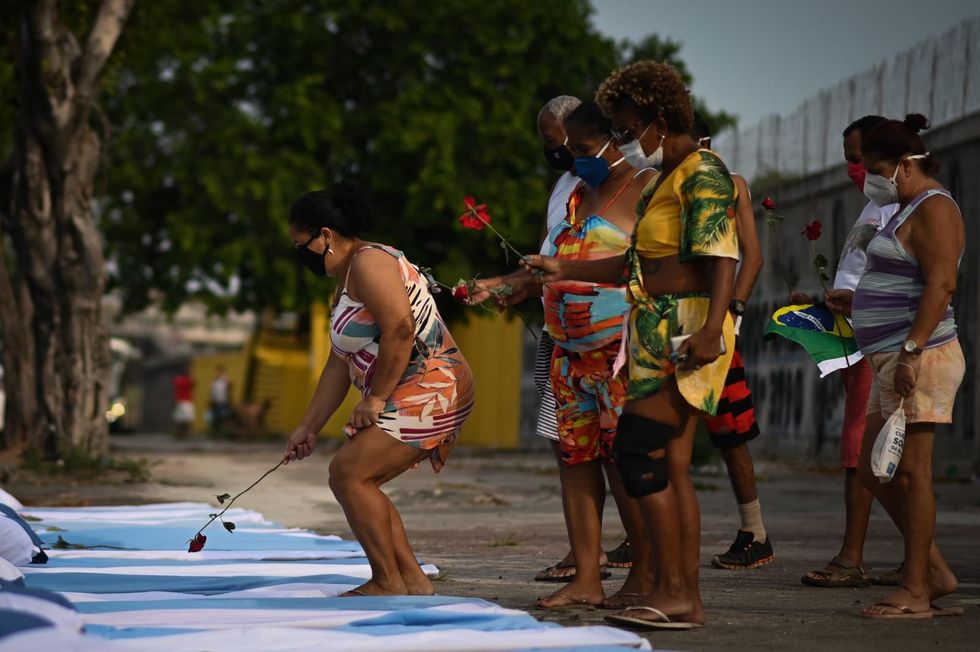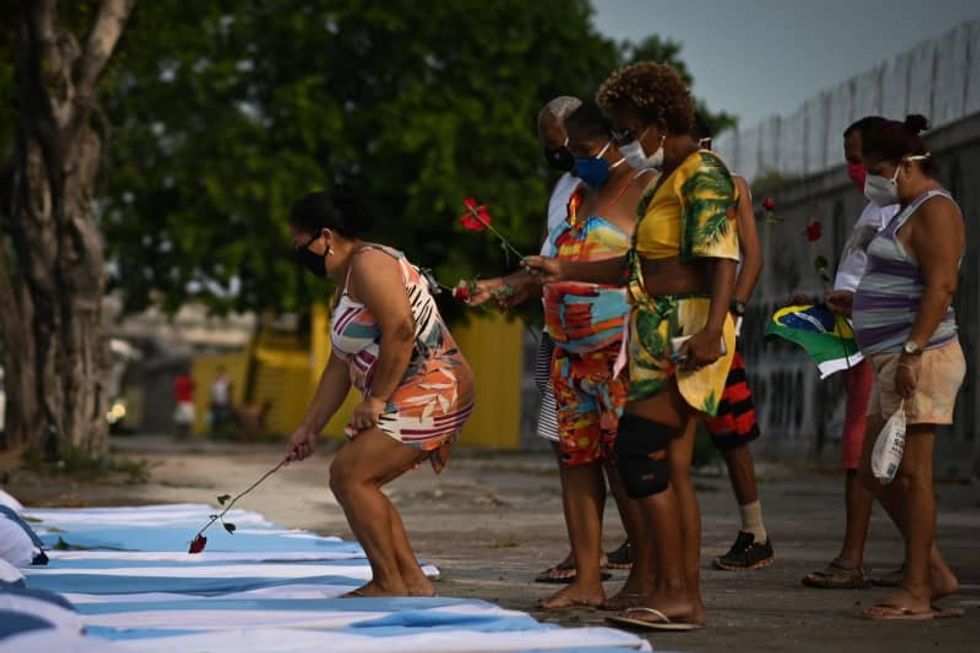

In front of the Hospital Ronaldo Gazzola in the north of Rio de Janeiro there are 30 mats, made to look like beds with sheets and pillows, with roses lying on them.
They're meant to symbolize the hospital beds in which Covid-19 patients are treated. Many stop by to lay a rose for someone who has died here during the pandemic.
But it's not just about remembrance. "We're here to demand the basics: a crisis cabinet, a joint effort by the president of the republic, the governors and the mayors," Antonio Carlos Casto, head of the non-governmental organization Rio de Paz, says.
Brazil, a country of 210 million people, is among the worst-hit countries during the pandemic, a tragic reality reflected in the symbolism of these 30 mats.
Each of these memorial beds represents 10,000 deaths.
In late March, Brazil became the second country in the world to surpass the 300,000 mark of registered Covid-19 deaths. Only in the United States, with 545,000 deaths, have more people fallen victim.
Another tragic milestone came at the same time: For the first time since the outbreak of the virus in Brazil, more than 3,000 people died in a single day.
Scientists expect that the average will soon be up to 3,500 deaths per day. More than 12.2 million people have been confirmed to be infected.
Experts say this trend is caused, at least to some degree, by a variant of the coronavirus that was detected in travellers from the Amazon region in January.
"This new variant appears to have a greater speed of infection. Cases seem to develop more quickly," said epidemiologist Diego Xavier, who works at the Fundacao Oswaldo Cruz (Fiocruz) research institution. The variant has now been detected in other continents.
An infection with this strain is not necessarily more lethal, however, and according to a study, vaccines from Biontech/Pfizer and AstraZeneca work better against it than initially thought.
But with so many people infected, hospitals are full. In some places, patients can barely be given care. Brazil's healthcare system is about to collapse - or indeed has already collapsed in many places.
Not only is the large Amazonos city of Manaus being hit hard, but also the south and south-east in particular: Sao Paulo, Brazil's richest city, and the state of Rio Grande do Sul.
In 24 of 26 states, as well as in the capital district of Brasilia, the situation in intensive care units is in "critical condition."
Hundreds are waiting for a bed, many of them dying before they get one. Medicine and oxygen supplies are in shortage, while sedatives and muscle blockers used for intubation are running particularly low, according to a BBC Brasil report, citing the Council of Health Secretaries in all states.
Younger people are not being spared. "People go out thinking they will only lose taste and smell," said Sao Paulo state health secretary Jean Gorinchteyn. "And they end up losing their lives."
The increasing spread of Sars-CoV-2 has favoured "worrying variants" such as the new P.1 variant, according to Fiocruz.
"The big problem is that this variant has appeared in Brazil because the pandemic was already out of control," Xavier says. "This is happening - like in the UK or South Africa - where there are many cases and high levels of infection."
Brazil's President Jair Bolsonaro has, meanwhile, downplayed the coronavirus from the beginning.
"If the president continues like this and infections continue, there may be another new variant that doesn't respond to a vaccine," Xavier says.
However, following the return of popular leftist former head of state Luiz Inacio Lula da Silva to the political stage, the right-wing populist has softened his tone somewhat - including with regard to vaccinations.
He has since announced the formation of a crisis committee. Bolsonaro also points to efforts to acquire vaccines, saying 500 million doses of vaccines by the end of the year are "guaranteed."
"2021 will be the year of vaccination for Brazilians," the president promises.
Many don't believe him. As a sign of protest, they've taken to streets banging on pots and pans, some calling him a "murderer."
Again and again, Brazil had postponed the start of vaccination, and corrected the amount of its available vaccine doses.
This is all the more tragic because the country actually has the means for a successful vaccination campaign - a comprehensive and free public health system, under which 80 million people were vaccinated against the influenza virus in three months in 2019.
A small light on the horizon might be a factory in northern Rio that has begun large-scale production of the Astrazeneca vaccine. However Bolsonaro continues to reject a lockdown on economic grounds.




